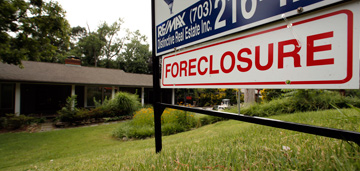
Reuters/Kevin Lamarque
A foreclosure sale sign sits in front of a house in Falls Church, Va., on July 23, 2008.
Eight years ago, who could have predicted that the final days of the Bush administration would include one of the most significant government interventions in the economy in American history? George Bush made tax cuts the centerpiece of his economic agenda. The decision to place Fannie Mae and Freddie Mac, which between them own half of all the residential mortgages in the United States, into a government conservatorship has now saddled American taxpayers with potential new liabilities that could reach hundreds of billions of dollars.
In effect, the U.S. government has declared it will not allow the U.S. mortgage market to collapse, bringing down the rest of the global economy with it. Nearly everyone agrees that Hank Paulson and Ben Bernanke had no choice — the consequences of not acting were simply too great. That this is happening under George Bush’s watch is the most dramatic demonstration we have seen in modern times that ideology is no defense against economic reality.
And yet, an ideological frenzy still rages.
Economists on the left and right have both long been critical of the half-public, half-private status of the two “government-sponsored enterprises.” Fannie Mae and Freddie Mac are supposed to be profit-seeking entities owned by private shareholders. But because of their congressional charter and their mandate to make housing more affordable to all, investors have always assumed that owning shares in the two GSEs, or bonds and mortgage-backed securities issued by the two GSEs, would be safe. The risk of default was judged low because it was always assumed that the government stood ready to make good on any debts. As we are now witnessing, that assumption was correct.
The critical difference between right and left points of view on this issue is that the right thinks the government shouldn’t be involved at all in the housing market, while the left believes that Fannie Mae — which was originally created during the Great Depression as a fully public agency entrusted with propping up the housing market — never should have been transformed into a semi-public, semi-private entity in the first place. This gets to the heart of a distinction made by Paul Krugman in his blog today between “nationalization” and “deprivatization.” Headlines declaring that Fannie and Freddie are being “nationalized” are running rampant through the blogosphere, summoning up visions of banana republics kicking out Yankee oil companies in the name of the revolution! But what’s really happening is that the bastard halfway privatization of Fannie Mae has now been revoked.
We can all agree, therefore, with Treasury Secretary Hank Paulson when he calls the whole concept of the government-sponsored-but-privately-owned-profit-making-enterprise “a flawed business model.” But let’s not fool ourselves into believing that if Fannie Mae and Freddie Mac (which was not created until 1970, to give Fannie Mae a competitor) had been fully privatized we could have avoided the current mess — and by “mess” I mean the larger housing crisis with all its attendant global ramifications.
A point that gets easy to miss in the current hullabaloo over the bailout is that Fannie and Freddie were not primarily responsible for either the housing boom or its bust. That responsibility is more fully borne by the non-government sponsored enterprises who play in the real estate market — the private mortgage lenders, commercial banks, investment banks and myriad institutional and hedge fund investors who engaged in an orgy of exotic mortgage loan and mortgage security innovation and speculation. Toward the very end of the boom, Fannie and Freddie did begin to get more involved in subprime loans and related derivative markets, but that was because they were losing market share to the fully private sector.
We shouldn’t be shocked at all that Wall Street went completely overboard in its love affair with housing market manipulation. That’s what happens when a market is left to its own devices, and government eschews its oversight responsibility. That’s what always happens. And when the mess gets big enough, government has to step in and clean everything up, which means that even if the feds had kept their hands totally clean — if there had been no Fannie Mae and Freddie Mac muddying the waters — some kind of public entity would have had to be created as the government vehicle for correcting market failure.
In a perfect libertarian world, markets would efficiently self-correct, and those who foolishly took on too much risk would lose all their money. But we’ve never had that world, and the way things are going, we’re never going to get there, either. The trend line of modern economic development inexorably tells us that everything is constantly getting more interconnected and more complex. Which means that when something breaks in, say, the U.S. housing market, it doesn’t just imperil the Wall Street hedge fund traders and investment banks who made bad bets on subprime-linked mortgage-backed securities — it also affects China’s central bank, small towns in Norway, pension funds across the globe, the value of the dollar, and much more.
The global economy is too big to fail. That’s the bottom line. If we didn’t have a Fannie Mae and Freddie Mac sitting around waiting to be nationalized, we would have had to create one.

